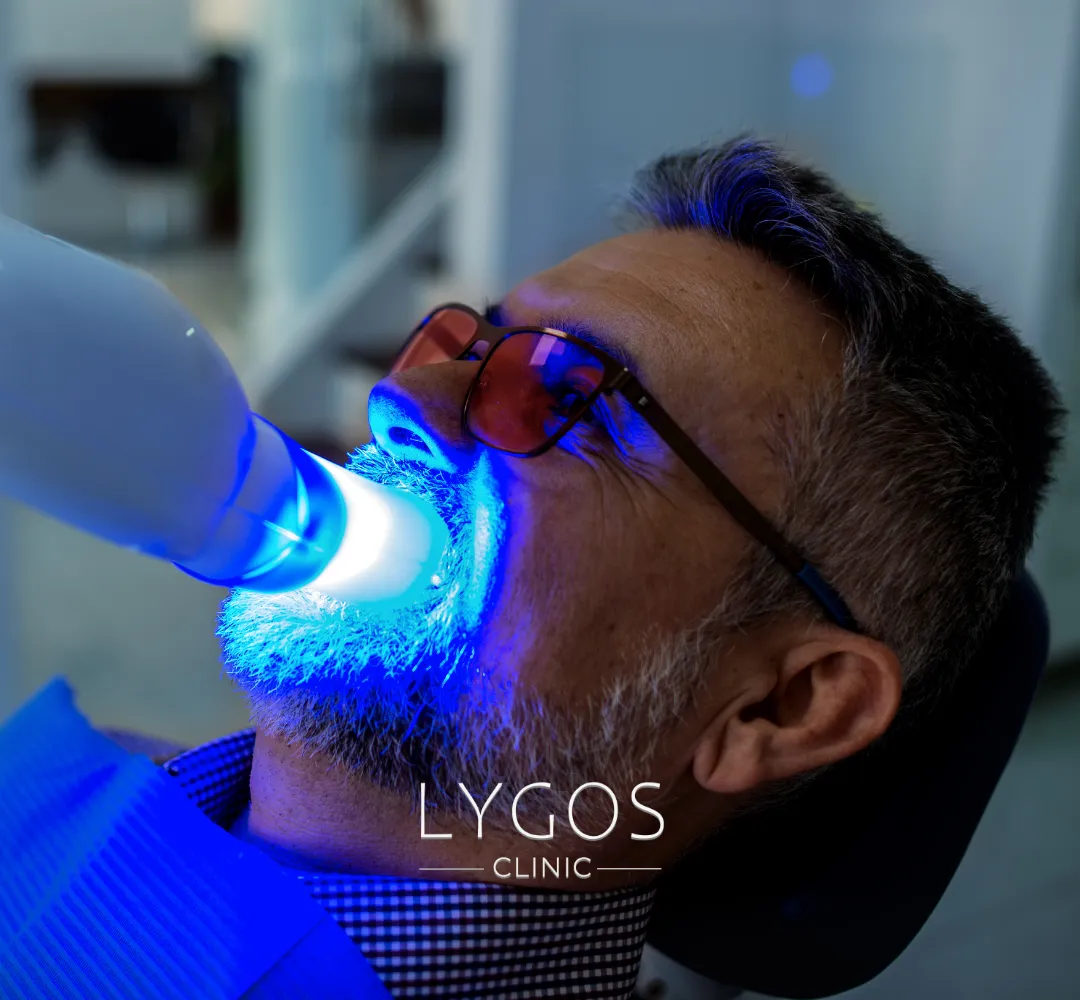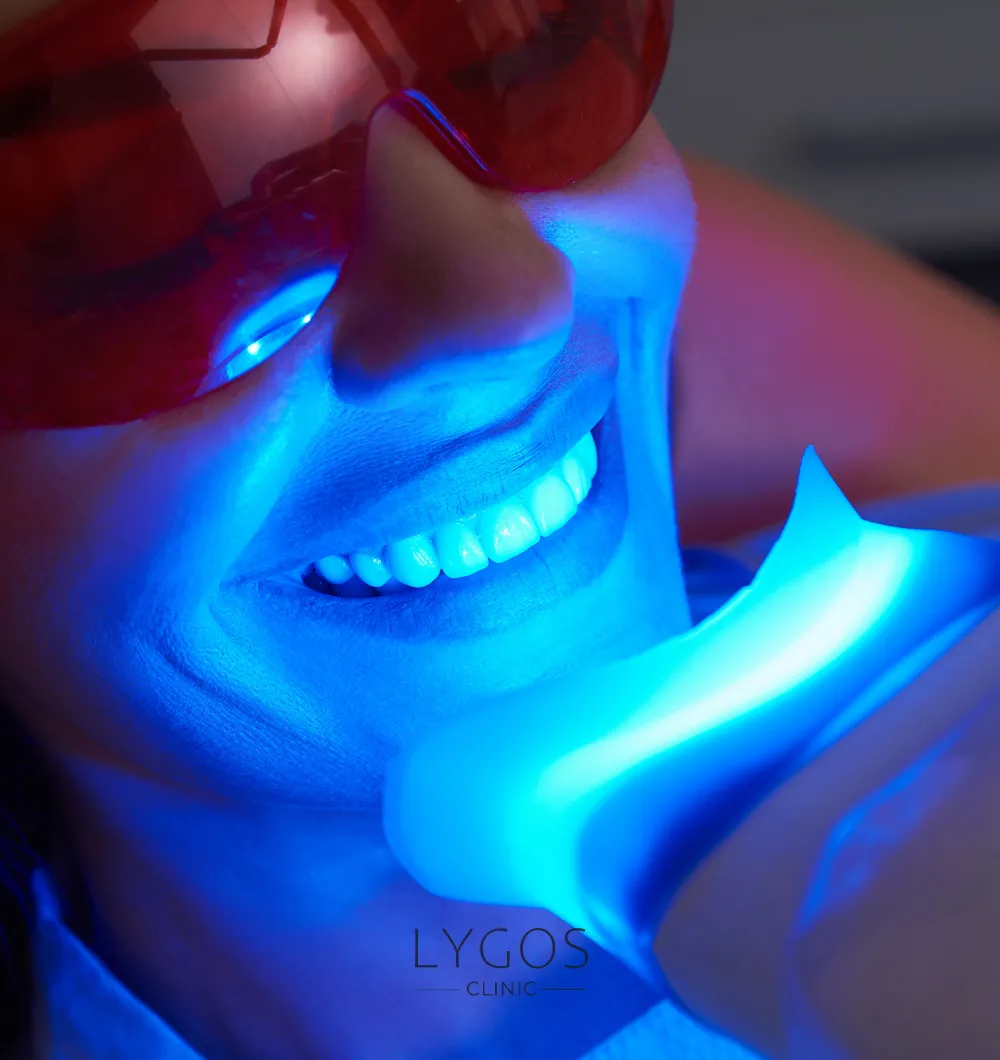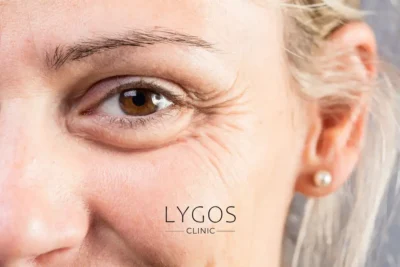Teeth Whitening
Patients who want a healthy, white smile, there are various methods available for teeth whitening. These methods range from professional treatments recommended by dentists to products used at home, each serving different purposes.
Choose Your Topic
Get in Touch
Get professional treatments in Turkey at Lygos Clinic, offering effective, affordable treatments for a healthier and more aesthetically pleasing life.
You can contact us via WhatsApp and Instagram for a quick response.

Teeth whitening is an important concern for many people with aesthetic priorities. In today’s society, the belief that a healthy appearance is associated with white teeth is widely accepted. Consequently, this procedure is increasingly in demand.
This process, which can also address psychological concerns, involves several methods. However, achieving effective and safe results depends on considering several important factors.
What is Teeth Whitening?
In everyday life, teeth can become yellowed due to irregular oral care, or from consuming certain foods and drinks. When teeth darken and change color, they may appear less attractive. Teeth whitening aims to restore a bright, healthy appearance by lightening the tooth color through a carefully planned treatment process.
- Professional whitening performed by a dentist is typically the most effective way to achieve lasting results.
- In addition, over-the-counter toothpastes and chemical products can help, though their effectiveness varies.
It is important to select the appropriate method for each individual since using the wrong approach might hinder results or even cause harm.


Who Is Teeth Whitening Suitable for?
Teeth whitening is an excellent option for enhancing your smile, but it isn’t suitable for everyone. Maintaining healthy teeth and gums is essential before undergoing any aesthetic procedure.
- Dental Examination: A thorough check-up is crucial to identify any cavities, gum disease, or other issues that need treatment first.
- Patients with advanced decay or gum disease should have these issues resolved before whitening.
- Teeth whitening is not recommended for individuals who have not completed their growth, pregnant or breastfeeding women, due to special health considerations.
A healthy mouth provides the best foundation for achieving a bright, white smile. Consulting with your dentist is the first step toward a successful outcome.
Teeth Whitening Methods
Everyone wants to have healthy, white teeth. To achieve this, they resort to various treatment methods. Teeth whitening, which is one of the most ideal options among them, includes various techniques used to improve the health and aesthetic appearance of a person's teeth.
It's a method that works according to everyone's personal needs, so it's important to make the right decision is after analysis.
Among the whitening methods with multiple treatment options, there are remarkable options such as Power Bleaching, Tray (apparatus), whitening pastes and whitening strips.

1. Power Bleaching
Power bleaching is known for its speed and effectiveness. In this method, a whitening gel containing carbamide peroxide or hydrogen peroxide is applied to the teeth and activated by a special light. Typically, this process—performed by a professional—can lighten tooth color by 3-4 shades in about an hour, making it ideal for those seeking quick, reliable results.
2. Tray Application
Custom dental trays are used at home with a whitening gel. This method usually requires wearing the tray for 30 minutes to an hour, enhancing the gel’s effect. It offers a balance between convenience and effectiveness.
3. Teeth Whitening Pastes
These pastes are formulated to remove external stains using mild abrasives. They work well for superficial discoloration, though long-term use may wear down the enamel. Thus, it is important to use them as directed.
4. Whitening Strips
Whitening strips contain a low concentration of hydrogen peroxide and are applied directly to the teeth. They are considered user-friendly, offering noticeable results within 5-7 days, and can be worn for 4-8 hours a day, depending on individual routines.

Why Do Teeth Lose Their Whiteness?
Yellowing of the teeth is one of the most important factors affecting a person's smile. These color changes, which are a common problem for many people, can occur due to various reasons.
According to dentists, understanding the factors that cause yellowing is critical for choosing appropriate treatment methods. So, why do teeth lose their whiteness? Here is the answer...
Internal Staining
Disorders in the internal structure of the teeth, antibiotics or excessive fluoride intake, especially during childhood, can lead to internal staining. These stains usually cannot be removed by brushing the teeth. Professional teeth whitening, which comes into play here, can offer an effective solution for this type of discoloration.
External Discoloration
Staining substances adhering to the tooth surface are called external discoloration. These discolorations, especially caused by beverages such as cigarettes, tea, coffee and cola, are usually seen in one out of every two people. In teeth whitening methods that come into play as a solution, tartar cleaning is performed. Professional cleaning procedures applied after this process can eliminate external discoloration and provide you with the tooth color you want.
As a result, choosing the right treatment against internal and external factors that cause yellowing of the teeth is an important step in having a healthy smile. By exchanging ideas with your dentist, you can get expert advice on whitening your teeth and dealing with discoloration. Remember that each individual's tooth structure is different, so creating a personalized treatment plan will ensure the most effective results.
Is Teeth Whitening Harmful?
Teeth whitening is generally not a harmful treatment. It is a popular treatment method that makes your smile brighter and more aesthetic. However, it is important to be informed about the possible risks that may be encountered in this process.
It is necessary to pay attention to the health effects of teeth whitening and the points to be considered. Otherwise, you may not get the desired result from the procedure and may be exposed to a negative effect.
During the procedure, which eliminates personal aesthetic concerns, it is necessary to make sure that the right physician and a suitable clinic are preferred. In a clinic that does not attach importance to hygiene, the operation carried out by an inexperienced physician is very likely to be harmful. For a healthy teeth whitening experience, the following conditions should be considered:


Tooth Sensitivity
Temporary sensitivity to hot or cold foods is common during the initial sessions but usually subsides as treatment continues.

Sensitivity in the Gums
Whitening products can sometimes irritate the gums. It’s important to minimize contact with gum tissue during treatment.

Incompatibility with Other
Dental Treatments
Whitening can affect the color match of existing dental work such as crowns, implants, or fillings. Discussing your complete dental history with your dentist is important to ensure a uniform appearance.
The whiteness obtained with teeth whitening is not permanent. Therefore, it is important to repeat the treatments at regular intervals at home or under the supervision of your dentist. It should not be forgotten that regular maintenance will also extend the lifespan.
After teeth whitening, avoiding products that cause discoloration such as tea, coffee and cigarettes is an important part of maintaining whiteness.
Excessive consumption of such products can shorten the lifespan and even damage the teeth whitening method.
As a result, you should take care to make joint decisions with your dentist for a healthy teeth whitening experience. By being careful against possible complications during the treatment process, you can reflect your smile to the whole world. However, you should not ignore your dental health in this process.

How Long Does Teeth Whitening Last?
The duration of teeth whitening varies from patient to patient and depends on several factors:
Personal Factors
The initial tooth color, the thickness of enamel, and overall oral health play a role.
Care Habits
Avoiding staining foods and beverages for at least two weeks after whitening, along with regular oral hygiene, can prolong results.
On average, the effects of teeth whitening can last anywhere from six months to two years. Your dentist’s recommendations for maintenance will help sustain the brightness of your smile.
Teeth Whitening Costs
Prices for teeth whitening vary based on the method used (bleaching, tray systems, home applications) and the quality of materials. The experience of the clinic and the dentist also influences the cost. Since each technique has its own price range, it is difficult to provide a definitive figure. Consultation with a dental professional can help determine the most appropriate method and cost for your situation.


Is Teeth Whitening Allowed for People Who Have Root Canal Treatment?
Teeth that have undergone root canal treatment may lose their vitality and brightness over time. Special techniques are available to whiten these teeth, often requiring multiple sessions. Because the materials inside treated teeth can also discolor, meticulous application is essential for lasting results. Post-treatment care and healthy eating habits are key factors in maintaining the whitening effect, which can last an average of 2 to 3 years before needing repetition.
Note that teeth whitening is not suitable for pregnant or breastfeeding women, individuals under 18, or those with significant dental issues such as exposed roots, gum disease, or dental caries. Addressing these issues first is recommended.
Teeth Whitening in Turkey
Turkey is recognized as one of the best destinations for teeth whitening worldwide. Turkish clinics offer various whitening methods tailored to each patient’s needs, and patients benefit from high health standards and state-of-the-art technology. With prices up to 70% more affordable than those in America and Europe, Turkey provides a unique aesthetic experience. In addition to the treatment, patients can enjoy the rich history and attractive atmosphere of the country, making the entire experience even more memorable.


Do Teeth Whiten at the Same Rate in Everyone?
While many people desire a brighter, healthier smile, the rate at which teeth whiten varies among individuals. Factors such as enamel thickness, dentin properties, and the overall condition of the teeth affect how quickly whitening occurs. Specialized gels and treatments can help reduce discoloration caused by smoking, coffee, or tea, but individual results will vary.
Permanent Teeth Whitening
For those seeking a long-lasting solution, permanent teeth whitening methods are increasingly popular. A permanent whitening procedure not only enhances aesthetics but also promotes overall dental health. However, the most appropriate method should be selected after careful examination by a qualified dentist, as an improper choice could reduce longevity or cause the procedure to fail.


Laser Teeth Whitening
Laser teeth whitening is a popular, professional method that uses a cosmetic laser to activate a concentrated hydrogen peroxide gel applied to the teeth. The laser heats the gel, enhancing its effectiveness in removing stains. The entire process typically takes between 30 minutes to an hour, and noticeable results are often seen immediately.
Teeth Whitening Costs with Gel
The cost of teeth whitening with gel varies based on exchange rates, material costs, and the specific gel brand used by the clinic. Clinics that use higher-quality products may charge more, and the overall cost can also depend on the amount of gel required. The experience and equipment of the dentist further influence the final price. For the most accurate information, it is advisable to consult with a professional team, such as that at Lygos Clinic.

Get in Touch
Get professional treatments in Turkey at Lygos Clinic, offering effective, affordable treatments for a healthier and more aesthetically pleasing life.
You can contact us via WhatsApp and Instagram for a quick response.
Frequently Asked Questions About Teeth Whitening
Botoks terleme tedavisi, botulinum toksininin ter bezlerinin aşırı terlemesine neden olan sinirlerin iletişimini engelleyerek çalışır. Bu şekilde ter üretimi azalır.
BLOG

Measuring Your Body With a Tape Measure: Correct Techniques for Accurate Results
Chose Your Topic Measuring Your Body With a Tape Measure: Correct Techniques for Accurate Results Accurate body measurements depend on

Crow’s Feet : Causes, Prevention, And Best Treatments
Chose Your Topic Crow’s Feet: What They Are And How To Treat Them Crow’s feet are fine lines that form

Hair Removal Cream in Pregnancy: Is It Safe?
Chose Your Topic Can Hair Removal Cream Be Used During Pregnancy? Hair removal (depilatory) creams are generally considered low risk



